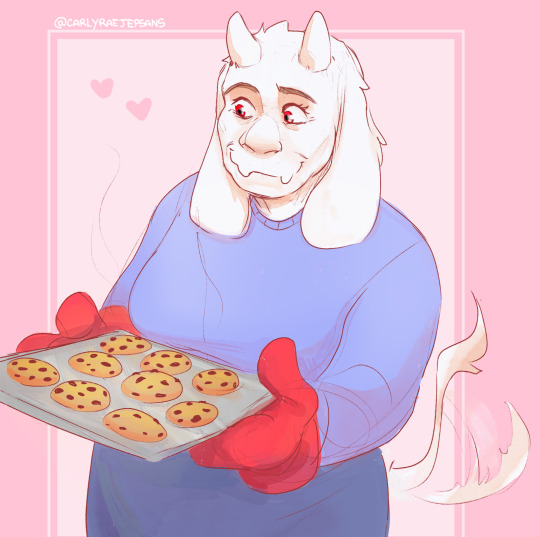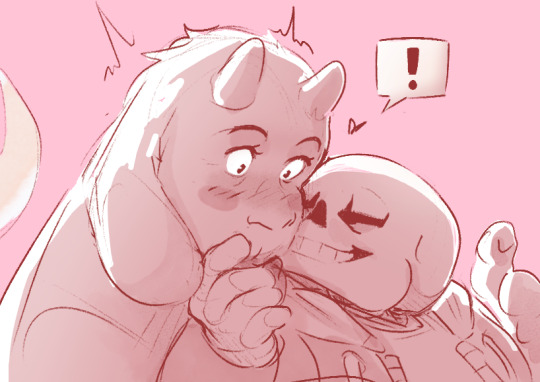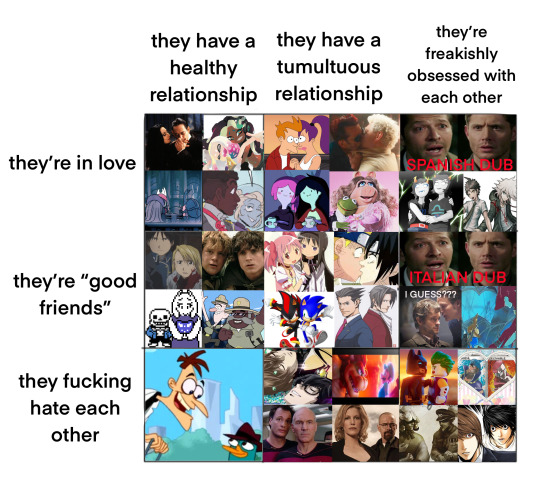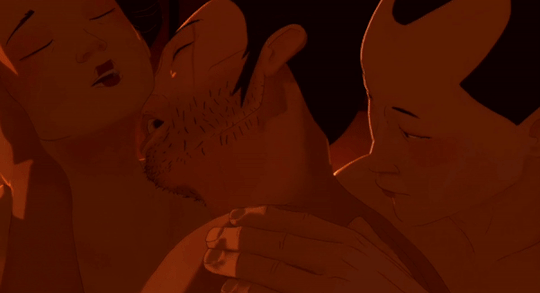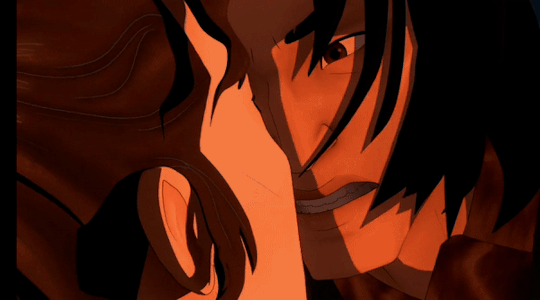She/they (close to being a was/were) ASKS ARE OPEN artist on tumblr
Don't wanna be here? Send us removal request.
Text
When in doubt, cling to undertale like no deltarune tomorrow



168 notes
·
View notes
Text

You know, I’ve always been a Soriel guy at heart
365 notes
·
View notes
Note
hello, how are you?
Are you planning on continuing the himob au?
i’m good ☺️ AND IM BACK BABY HAHAHA

21 notes
·
View notes
Text
“We need more reception arcs like Zuko’s!”
Baby girl, you couldn’t even handle Taigen.
A huge reason why Zuko has been immortalized so fervently is because ATLA came out in the mid 2000s, nearing two decades ago. With the state of basic reading comprehension, much less media literacy, social awareness, and chronically online behaviour that exists nowadays in a way it did not exist fifteen years ago, I would be surprised if the live action ATLA tv adaptation didn’t make Zuko a bit more likeable right off the bat. I’m not saying I agree with it, but if the show-runners are concerned about audiences reactions to Sokka’s (wrong, but relatively mild) sexism that exists in only the first few episodes of the show, then the idea of redeeming Zuko has got to be terrifying them. Tbh I don’t entirely blame them, even though I’m not certain it’s a good idea for the story as an adaptation.
272 notes
·
View notes
Text
Very interesting to me that a certain subset of the BES fandom's favourite iterations of Mizu and Akemi are seemingly rooted in the facades they have projected towards the world, and are not accurate representations of their true selves.
And I see this is especially the case with Mizu, where fanon likes to paint her as this dominant, hyper-masculine, smirking Cool GuyTM who's going to give you her strap. And this idea of Mizu is often based on the image of her wearing her glasses, and optionally, with her cloak and big, wide-brimmed kasa.
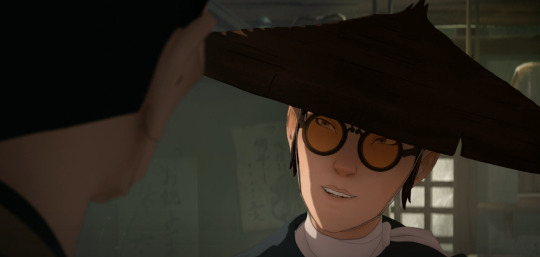

And what's interesting about this, to me, is that fanon is seemingly falling for her deliberate disguise. Because the glasses (with the optional combination of cloak and hat) represent Mizu's suppression of her true self. She is playing a role.

Take this scene of Mizu in the brothel in Episode 4 for example. Here, not only is Mizu wearing her glasses to symbolise the mask she is wearing, but she is purposely acting like some suave and cocky gentleman, intimidating, calm, in control. Her voice is even deeper than usual, like what we hear in her first scene while facing off with Hachiman the Flesh-Trader in Episode 1.
This act that Mizu puts on is an embodiment of masculine showboating, which is highly effective against weak and insecure men like Hachi, but also against women like those who tried to seduce her at the Shindo House.
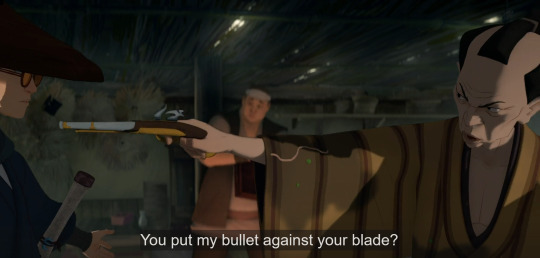

And that brings me to how Mizu's mask is actually a direct parallel to Akemi's mask in this very same scene.
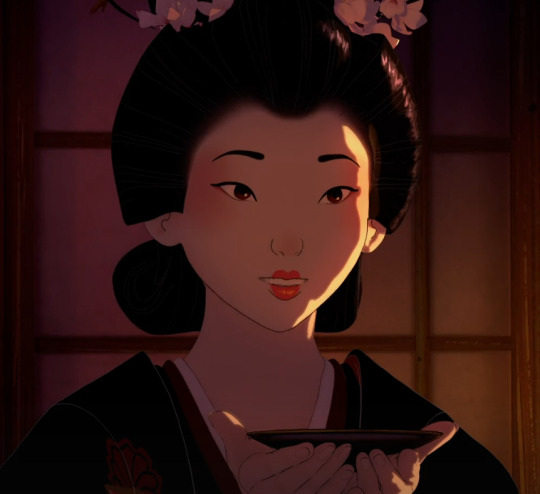
Here, Akemi is also putting up an act, playing up her naivety and demure girlishness, using her high-pitched lilted voice, complimenting Mizu and trying to make small talk, all so she can seduce and lure Mizu in to drink the drugged cup of sake.
So what I find so interesting and funny about this scene, characters within it, and the subsequent fandom interpretations of both, is that everyone seems to literally be falling for the mask that Mizu and Akemi are putting up to conceal their identities, guard themselves from the world, and get what they want.
It's also a little frustrating because the fanon seems to twist what actually makes Mizu and Akemi's dynamic so interesting by flattening it completely. Because both here and throughout the story, Mizu and Akemi's entire relationship and treatment of each other is solely built off of masks, assumptions, and misconceptions.
Akemi believes Mizu is a selfish, cocky male samurai who destroyed her ex-fiance's career and life, and who abandoned her to let her get dragged away by her father's guards and forcibly married off to a man she didn't know. on the other hand, Mizu believes Akemi is bratty, naive princess who constantly needs saving and who can't make her own decisions.
These misconceptions are even evident in the framing of their first impressions of each other, both of which unfold in these slow-motion POV shots.
Mizu's first impression of Akemi is that of a beautiful, untouchable princess in a cage. Swirling string music in the background.
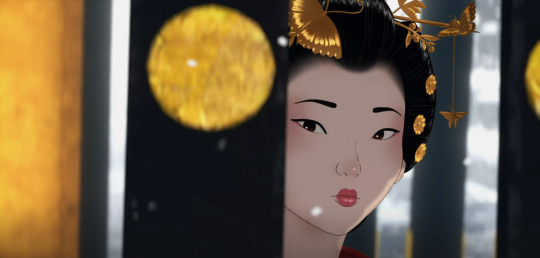
Akemi's first impression of Mizu is of a mysterious, stoic "demon" samurai who stole her fiance's scarf. Tense music and the sound of ocean waves in the background.

And then, going back to that scene of them together in Episode 4, both Mizu and Akemi continue to fool each other and hold these assumptions of each other, and they both feed into it, as both are purposely acting within the suppressive roles society binds them to in order to achieve their goals within the means they are allowed (Akemi playing the part of a subservient woman; Mizu playing the part of a dominant man).
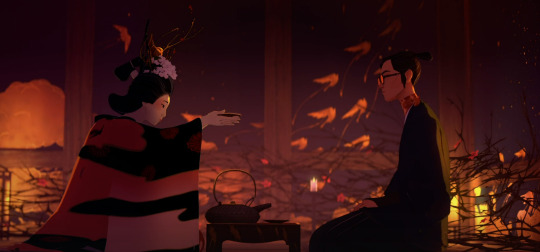
But then, for once in both their lives, neither of their usual tactics work.
Akemi is trying to use flattery and seduction on Mizu, but Mizu sees right through it, knowing that Akemi is just trying to manipulate and harm her. Rather than give in to Akemi's tactics, Mizu plays with Akemi's emotions by alluding to Taigen's death, before pinning her down, and then when she starts crying, Mizu just rolls her eyes and tells her to shut up.
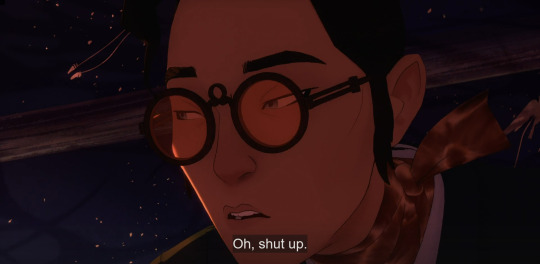
On the opposite end, when Mizu tries to use brute force and intimidation, Akemi also sees right through it, not falling for it, and instead says this:
"Under your mask, you're not the killer you pretend to be."
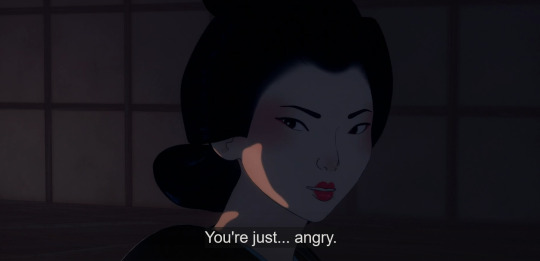
Nonetheless, despite the fact that they see a little bit through each other's masks, they both still hold their presumptions of each other until the very end of the season, with Akemi seeing Mizu as an obnoxious samurai swooping in to save the day, and Mizu seeing Akemi as a damsel in distress.
And what I find a bit irksome is that the fandom also resorts to flattening them to these tropes as well.
Because Mizu is not some cool, smooth-talking samurai with a big dick sword as Akemi (and the fandom) might believe. All of that is the facade she puts up and nothing more. In reality, Mizu is an angry, confused and lonely child, and a masterful artist, who is struggling against her own self-hatred. Master Eiji, her father figure who knows her best, knows this.
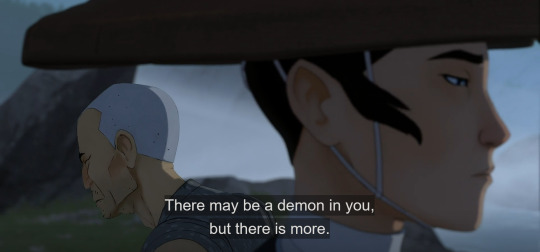
And Akemi, on the other hand, is not some girly, sweet, vain and spoiled princess as Mizu might believe. Instead she has never cared for frivolous things like fashion, love or looks, instead favouring poetry and strategy games instead, and has always only cared about her own independence. Seki, her father figure who knows her best, knows this.
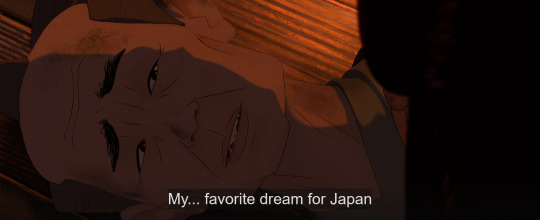

But neither is she some authoritative dominatrix, though this is part of her new persona that she is trying to project to get what she wants. Because while Akemi is willful, outspoken, intelligent and authoritative, she can still be naive! She is still often unsure and needs to have her hand held through things, as she is still learning and growing into her full potential. Her new parental/guardian figure, Madame Kaji, knows this as well.
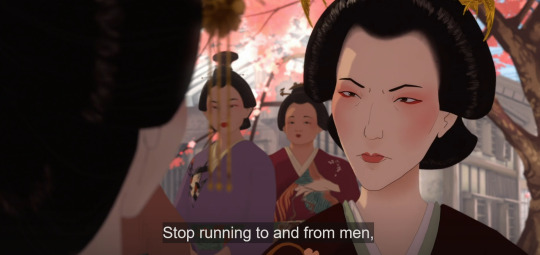
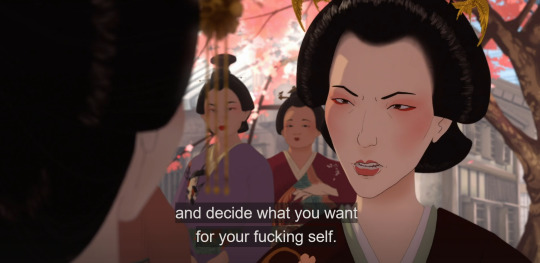
So with all that being said, now that we know that Mizu and Akemi are essentially wearing masks and putting up fronts throughout the show, what would a representation of Mizu's and Akemi's true selves actually look like? Easy. It's in their hair.
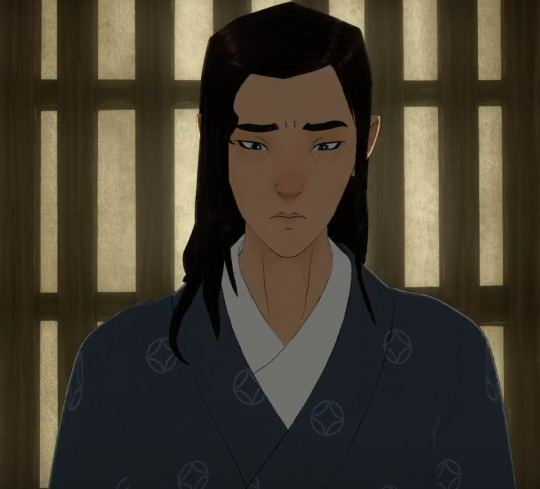

This shot on the left is the only time we see Mizu with her hair completely down. In this scene, she's being berated by Mama, and her guard is completely down, she has no weapon, and is no longer wearing any mask, as this is after she showed Mikio "all of herself" and tried to take off the mask of a subservient housewife. Thus, here, she is sad, vulnerable, and feeling small (emphasised further by the framing of the scene). This is a perfect encapsulation of what Mizu is on the inside, underneath all the layers of revenge-obsession and the walls she's put around herself.
In contrast, the only time we Akemi with her hair fully down, she is completely alone in the bath, and this scene takes place after being scorned by her father and left weeping at his feet. But despite all that, Akemi is headstrong, determined, taking the reigns of her life as she makes the choice to run away, but even that choice is reflective of her youthful naivety. She even gets scolded by Seki shortly after this in the next scene, because though she wants to be independent, she still hasn't completely learned to be. Not yet. Regardless, her decisiveness and moment of self-empowerment is emphasised by the framing of the scene, where her face takes up the majority of the shot, and she stares seriously into the middle distance.
To conclude, I wish popular fanon would stop mischaracterising these two, and flattening them into tropes and stereotypes (ie. masculine badass swordsman Mizu and feminine alluring queen but also girly swooning damsel Akemi), all of which just seems... reductive. It also irks me when Akemi is merely upheld as a love interest and romantic device for Mizu and nothing more, when she is literally Mizu's narrative foil (takes far more narrative precedence over romantic interest) and the deuteragonist of this show. She is her own person. That is literally the theme of her entire character and arc.
907 notes
·
View notes
Text
y’know I respect a fan’s choice about how they want to view mizu but tiny ramble about it here. this isn’t any sort of discussion or ‘matter of fact’ essay, just a simple rant about headcannons about her being TRANS and her SEXUALITY.
Warning: extremely long.
Given the numerous limitations that would arise from traveling as a woman, I find it very difficult to understand why some people believe Mizu is transgender when it's obvious that she is hiding this information in order to survive. This was particularly true during the Edo period, when women were dehumanized and treated like objects because we only ever see them as a slave or working in a brothel (majority of the show at least). They were also seen having to depend on men for nearly everything, as demonstrated in the episode where the mother and daughter were left outside to freeze to death since her husband was not present to accompany them. There were a subtle hints presented to us that show how comfortable she is when in touch with her femininity like a few moments in the episode where she came back to Swords-father Eiji’s hut
Next, not gonna lie, I’m insanely guilty of this—but I feel that she is leaning more toward heterosexuality in terms of her sexuality. I have the biggest fattest crush on her so I have no problem stating how much I'm crying and wailing over this. Like c’mon, let's be real, I guarantee that 98% of simps are female, and I’m sure every single one of us has mentioned the fact that we can all treat her better than Mikio and Taigen. Speaking of him, I have to say that they have the best chemistry of everyone in the show (AAAH WHY WHY WHY), which pains me to admit. The moment when she pulls him away from those arrows that are shooting because she fears for his safety if he follows, saving him from Fowler's castle even though she could have easily just left him to die and slain Fowler, when she also brought him away from those shooting arrows, etc. I have dedicated my time to search for ANY hint (ok not rlly) that she might be attracted to women, but the only time I ever see her become flustered by one is when she appears to be taken aback by the woman she tried to ask for directions to the Shindo Dojo. Plus, there were only two occasions where she interacted with Akemi that people use to automatically ship them which is when she saw Akemi in her carriage and pinned her down in Madame Kaji's brothel, which is regrettable. Unfortunately, I can’t imagine them as a couple in later episodes, something I’m been dying to see. Despite that, I’m still rooting for AT LEAST bisexual Mizu because for the love of god and for the sake of all of the gay women here, PLEASE. (Sorry for bringing her sexuality into this, I’m aware of how the show isn’t circling over it and not every single thing has to be LGBTQ-related. I respect your opinion and if I come off as rude, I’m sorry, just random midnight thoughts🙏)

110 notes
·
View notes
Text
okay but the “I’m gonna kill you to regain my honour” to “use my body as cover so one of us makes it out alive” turnaround took about 0.8 seconds can you say enemies to lovers
186 notes
·
View notes
Text
Thoughts on Taigen and Mizu's Last Convo
More theories/thoughts on Blue Eye Samurai/Taigen/Mizu because that is all my brain can hold right now, Also ~SPOILERS~
I wonder if in the final scene we see between Taigen and Mizu, they are each having a completely different conversation.
Perhaps when Taigen says "It's your fight, it's my fight", he means "It's my fight because we are friends/potential lovers/idk anymore but you're important to me" but Mizu reads it as "It's my fight because I need to make sure you don't die, so I can kill you." When Taigen says "We're not finished" he means "Our story isn't finished, because now you are a part of my life and I am having a hard timing imagining it without you, but I'm not finished figuring out *what* this is exactly". But Mizu reads it as "You still have to duel me."
This is maybe why Mizu sounds sad/exasperated when she says "I know". Because (a) it's another thing for her to deal with and (b) a reminder that her desire for him doesn't hold weight, and that he she can't get rid of him, but also can't have him in the way she truly wants. And, (3) she knows she would beat him and kill him, but she doesn't WANT to. She wants him alive, and in her life.
So, on the low, they want the same thing. But the communication is way off.
264 notes
·
View notes
Text
We all already know Mizu and Akemi are narrative foils. But you know what? Lemme just say it, here's what I think:
Taigen and Mikio are foils.
Not necessarily to each other as individuals in the way that Mizu and Akemi juxtapose each other, but mostly in the contrast between their relationships with Mizu.
I've covered specific parallels between Taigen and Mikio in other posts I wrote; but as the number of parallels I'm noticing between them keeps piling up, I'm compelled to just compile them all in one post. So! This is, thus, the post in question.
First of all, let's look at their similarities.
1. Their status in society is the same. They are both samurai who lost their honour and have dreams of reclaiming it.
2. They are also both diligent as they strive to achieve this goal, they both care deeply about their work, but here as they begin to contrast, as the work in question and way they go about their goals is different:
For Mikio, his work is in taming and rearing horses; in order to prove himself, he must tame Kai—a willful and strong horse—and present it to his lord. For Taigen, his work is in sword fighting and martial arts; in order to prove himself, he must kill Mizu—a willful and strong swordsman—and present her dead body to his lord.
In the parallel above, not only are Taigen and Mikio contrasting each other, but Mizu and Kai are placed in comparison as well. And of course, Kai is Mizu's horse, and represents her. Which is why, when later, Mikio sells Kai off, it represents the way he is tossing Mizu (and their relationship) aside.
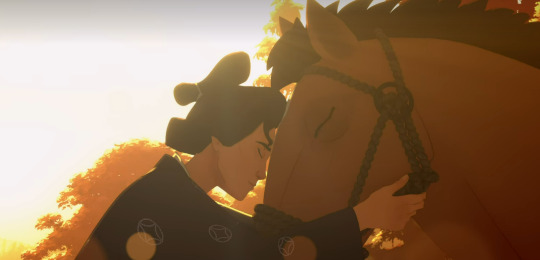
From there, the rest of the details of their character begin to contrast and juxtapose each other more clearly. So let's look at those differences, shall we?
Their backstory:
Mikio was a great samurai who was banished. A somebody to a nobody. Taigen was a fisherman’s son who rose to the top. A nobody to a somebody.
2. The first time we meet them on-screen:
Mikio is an adult. An older man. Mizu's superior in age. He is Mizu's to-be husband. A love interest. Taigen is a child. A young boy. Mizu's peer in age. He is Mizu's bully. An antagonist.

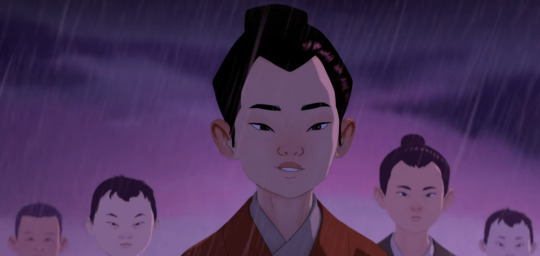
3. Their maturity and growth:
Mikio is mature, but stuck in his ways. Taigen is immature, but capable of changing and learning.
4. Their overall attitude:
Mikio is generally relaxed, easy-going and unfussy. Taigen is uptight, irritable and severe.
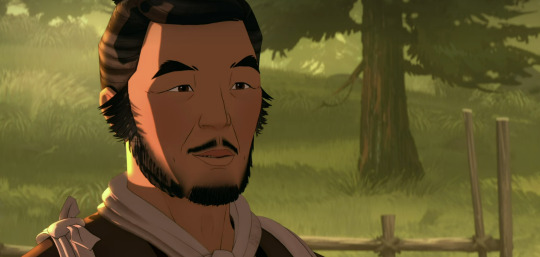
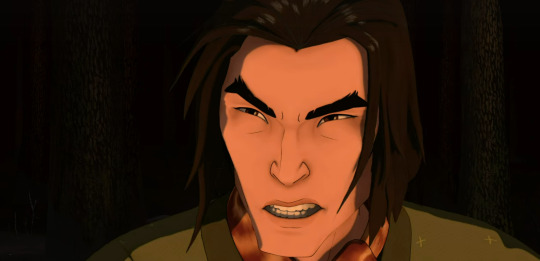
5. How they talk to and conduct themselves around Mizu:
Mikio is aloof, soft-spoken, and serious. Taigen is obnoxious, brash, and sarcastic. Mikio is quiet, speaking only when spoken to, even when Mizu turns to smile at him and shows openness to be near him. Taigen is loud, talking while others are silent, even when Mizu turns from him and shows no interest in conversing with him.

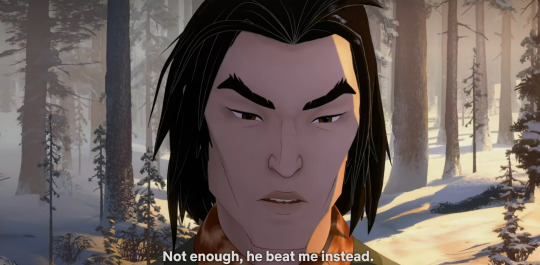
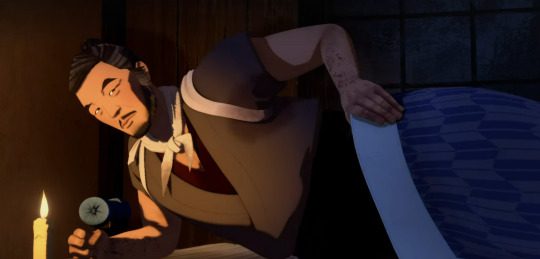

Mikio doesn't show much of who he is to Mizu throughout their marriage, despite their growing affection. Taigen openly shares his traumas and life story to Mizu during their brief alliance, despite their mutual antagonism.
6. Their external vs internal selves:
Mikio is calm, gentle, and considerate on the outside. Taigen is hot-headed, rude, and selfish on the outside. Mikio is cowardly and deceitful on the inside. Taigen is brave and loyal to a fault on the inside. Mikio tells Mizu that he wants to know and see all of her. But he scorns and betrays her, the woman he loves. Taigen tells Mizu that he wants to duel and kill him. But he endures torture to not betray him, the man he hates.
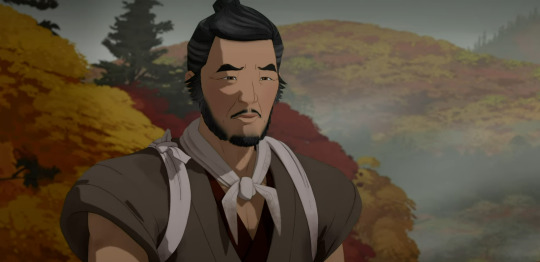
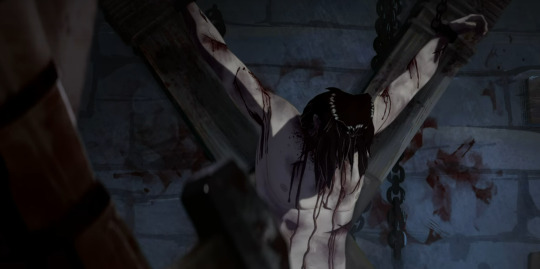


9. Their hair, a symbol of their honour:
Mikio's topknot is untied by Mizu during their spar. This humiliation occurs in private, the two of them alone in a rural location where no one can see them. Taigen's topknot is cut off by Mizu during their duel. This humiliation occurs in public, the two of them being watched by many others in the Shindo Dojo.
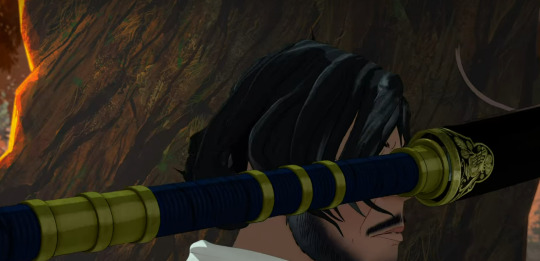
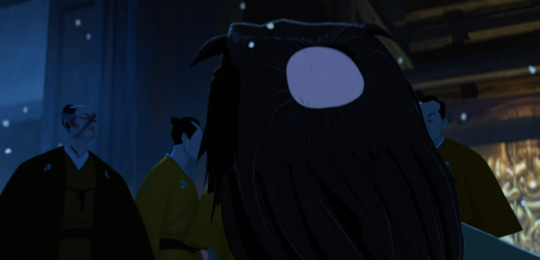
10. Their power dynamic with Mizu:
Mikio believes he is Mizu's mentor. He teaches her to throw knives, how to ride and care for horses, and about the tactical benefits of using a naginata. Taigen believes he is Mizu's equal. He views Mizu as a samurai like himself who received all the same teachings he did, and who possesses the same values.
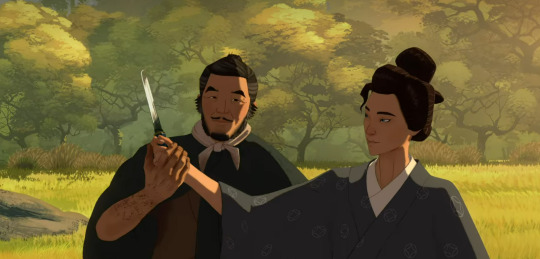
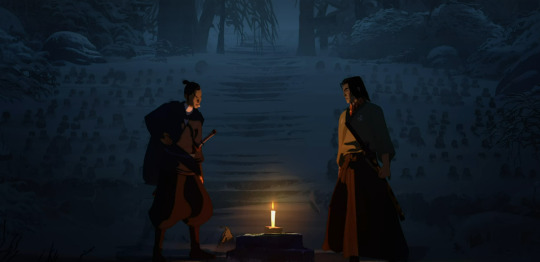
11. Their perceptions of Mizu:
Mikio sees Mizu's feminine side first. He sees her as sweet and gentle, but also clumsy and incompetent. Taigen sees Mizu's masculine side first. He sees her as terrifying and deadly, but also strong and skilled.
12. The way they approach sparring with Mizu:
Mikio only spars with Mizu once. As the fight progresses and she is beating him, he tries to put a stop to it. When she teases/provokes him, he starts taking the fight personally and seriously, finding no enjoyment in it. Taigen spars and brawls with Mizu all the time. No matter how many times Mizu beats him, he doesn't back down. When Mizu challenges him with a chopstick, he is eager to compete with her and gladly rises up to the challenge.
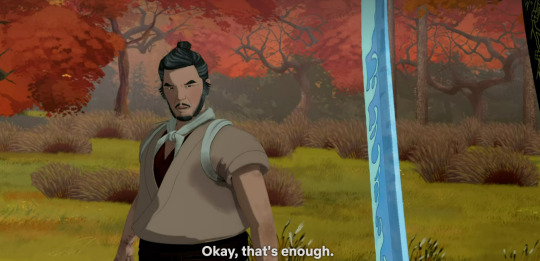
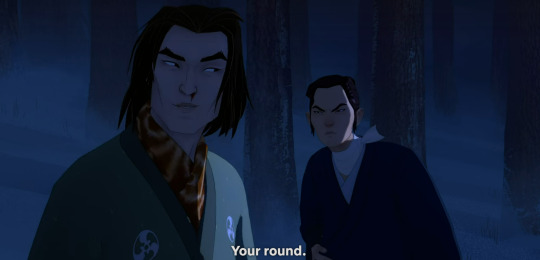
Mikio and Mizu's one and only spar is a friendly match; Mizu is smiling and having fun while he grows increasingly frustrated. Taigen and Mizu's last-seen spar is a playful wrestling match; both him and Mizu are having fun and laughing.

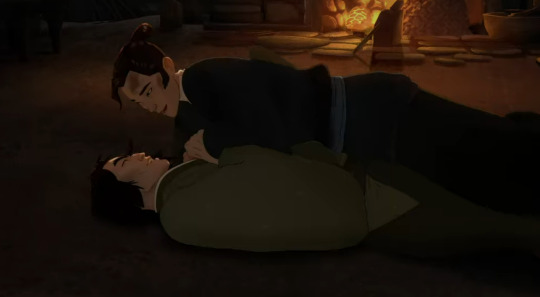
Mikio cannot deal with Mizu being better than him, so he scorns her and walks off, avoiding her thereafter. When Taigen cannot deal with Mizu being better than him, he follows her to observe her moves and continues training in hopes to eventually beat her. After being bested by Mizu once, Mikio leaves her and sells the horse he'd previously gifted to her. After many times losing to Mizu and fighting alongside her, Taigen commends her and admits she is better than him.
13. When Mizu pins them down in a friendly spar:
Mikio sees Mizu's whole face objectively. Taigen stares at Mizu's mouth and eyes.
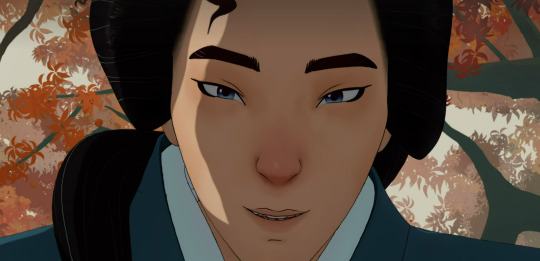

Mikio gets angry when she kisses him, throwing her off of him and snapping at her, calling her a monster. Taigen gets aroused, apologising, so she pulls herself off of him.
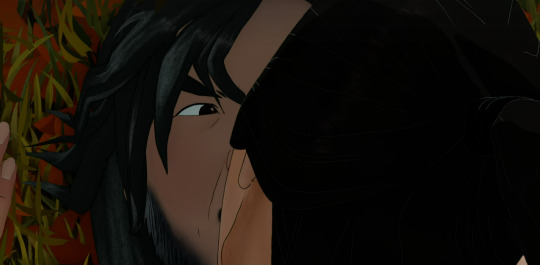
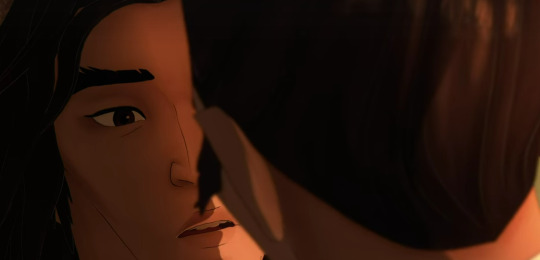
14. Mizu's blue meteorite sword is a reflection of her soul. She believes most are undeserving to face it, let alone hold it. And on that note:
Mikio is the first person (chronologically) that Mizu fights against using her sword. Taigen is the first person (we see on-screen) that Mizu fights against with her sword. Mikio is the first person (chronologically) to ever hold her sword, as she passes it to him, letting him wield it. Taigen is the first person (we see on-screen) to ever hold her sword, as she passes out, and he picks it up and carries it for her.
15. Then, last but not least, in Fowler's fortress, when she is drugged and in pain, she hears Ringo's voice in the dungeon. She then follows it to an open cell:
Mizu first sees Mikio as a hallucination, the sight of him haunting her and causing her to lose her grip on reality. Her eyes glow a surreal blue to represent this. Her Mama appears then and says Mizu's name accusingly.

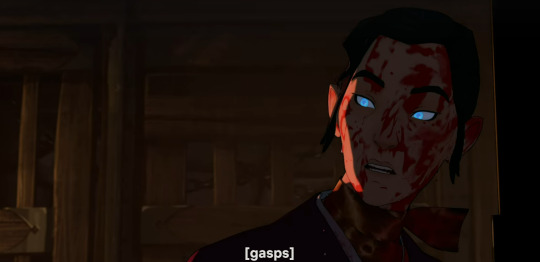
Mizu then sees Taigen, but he is real, the sight of him a relief and grounding her back to reality. Her eyes return to their normal blue colour to represent this. Taigen looks at Mizu weakly and says her name softly.
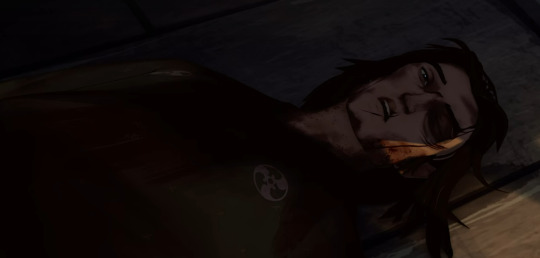

Then, later, when facing Fowler, her revenge awaiting her, she instead chooses to follow her conscience (represented by Ringo's voice in her mind), putting aside her vengeance for a time, in order to save Taigen.
So that's basically all the ones I've noticed so far, but even then, I feel there's already so much that forms a contrast between these two.
What makes it especially incredible about these juxtapositions is that Mikio was Mizu's husband, the man she had fallen in love with, the one person she had ever been intimate with, the man who made her begin to accept herself, to put down her desire for vengeance and instead live a life of peace and happiness.
So for Taigen to have so many parallels with him... Do you see what I'm saying here!
Not to mention that Mizu clearly already has some burgeoning attraction to him, as indicated by how she thinks of him when asked about her desires. And Taigen clearly has shown interest as well (see: him getting a boner after their spar, him holding her hand and telling her, "We're not done yet.").
And on the topic of speculating future possibilities of this relationship, this post by @stromblessed has pointed out yet another parallel between Taigen and Mikio:
Mizu promises Taigen to meet him for their duel in autumn. Mizu fell in love with Mikio and duelled him during autumn.
With all that said, I do believe Mizu and Taigen's relationship is definitely hurtling towards something. But whether they will actually end up together in a sustainable relationship and have a happily ever after? Well, that is a whole other story; we'll just have to wait and see.
598 notes
·
View notes
Text
the transphobia surrounding the conversation of mizu being a woman is.. concerning.
speaking as transman, the idea or theory that mizu is transgender in anyway is… not factual whatsoever. but the discourse around it is borderline terf-ish.
please keep in mind that a lot of the fandom of bes contains queer teens, that project on to their favorite characters in hope to see someone like their selves in media. there isn’t a lot of rep for these people, but, let me illiterate the fact that mizu is representation for biracial women. there is next to zero representation for mixed woman in our media
don’t be transphobic. thank you for reading, take care of yourself

ps — tags are just for reach🤓
391 notes
·
View notes
Text
the face of a man when his fiancee—a GORGEOUS PRINCESS whom he claims to be in love with—stands right in front of him, naked and trying to get him to have sex with her:
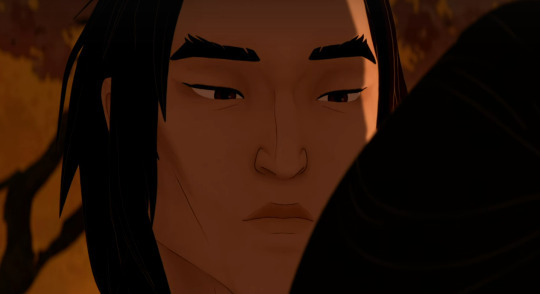
VS
the face of a man looking at his "enemy" whom he wants to kill and who constantly beats him in fights:


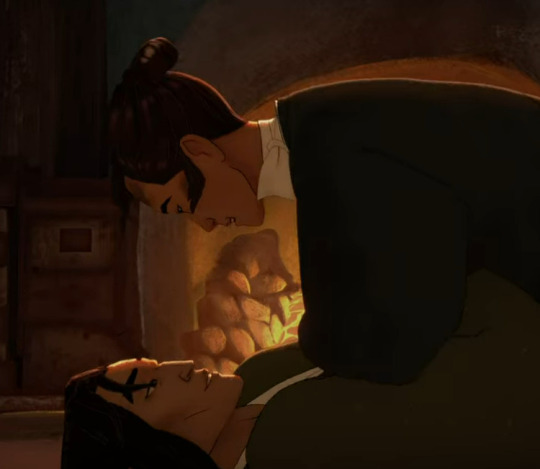
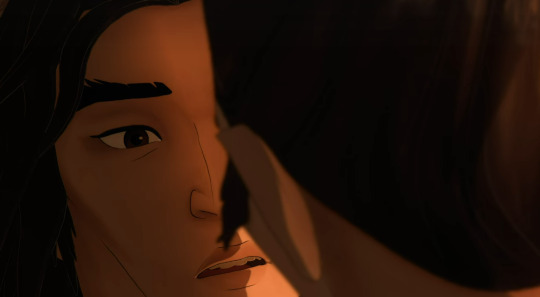

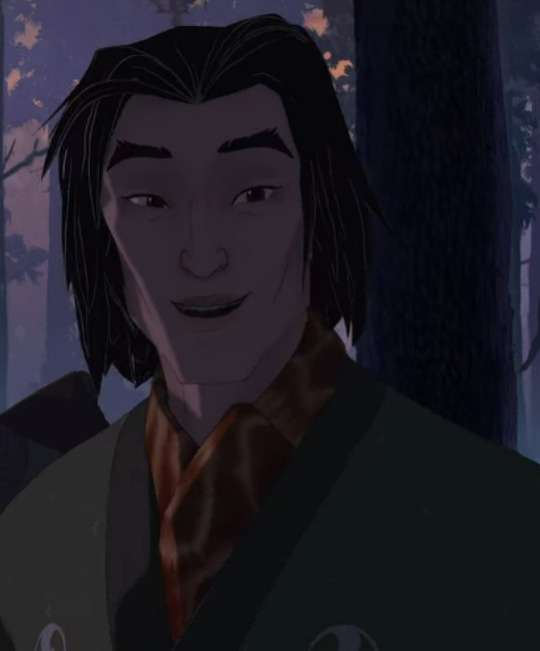

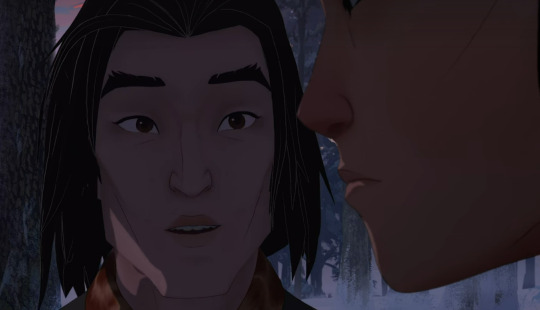
but i don't blame him, because just look at the "enemy" in question:

that's an angel. a beautiful, murderous angel sweetiepie pookie bear babygirl covered in dirt and the blood of her enemies 🥰🥰🥰


786 notes
·
View notes
Text
I don't know why but I feel kinda icky when people say they're grossed out that Mizu likes Taigen, and sO dIsApPoInTeD that she wasn't lesbian. Like...why can't she be bisexual or something??? She CLEARLY likes men and I feel people are erasing that part of her sexuality. I also feel like people are stereotyping Mizu by expecting her to be lesbo because she is very masculine. Don't get me wrong, as a lesbian I would LOVE more lesbian representation, but Mizu clearly isn't lesbian. Why can't y'all let the bi/pan community have a win for once? I dunno it just gives me the ick.
694 notes
·
View notes
